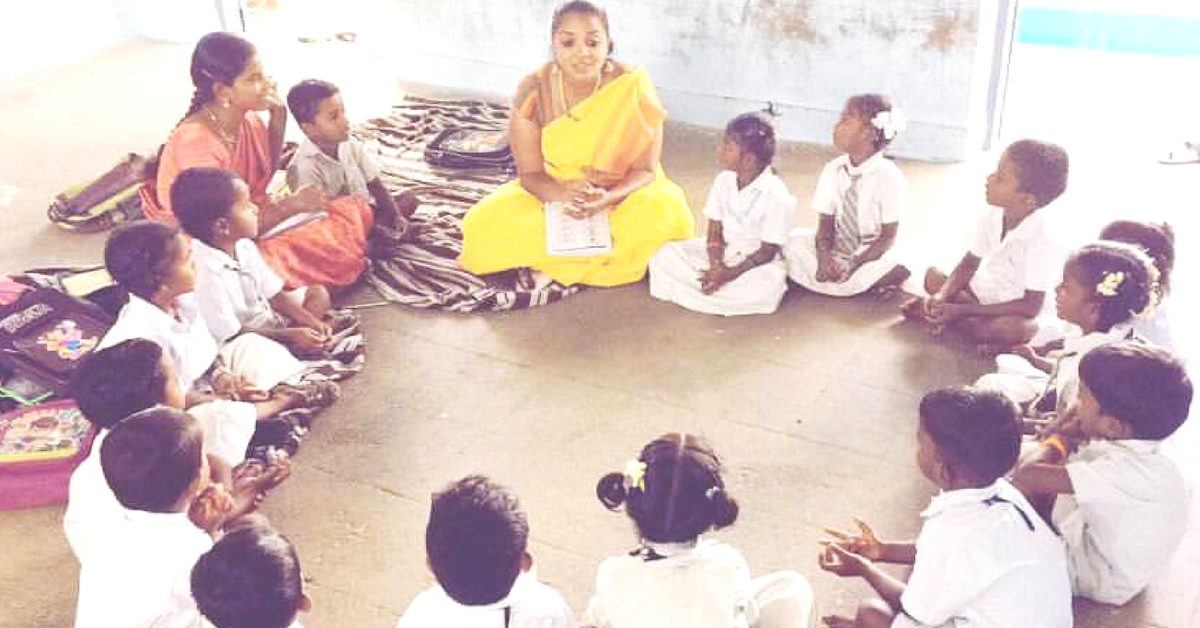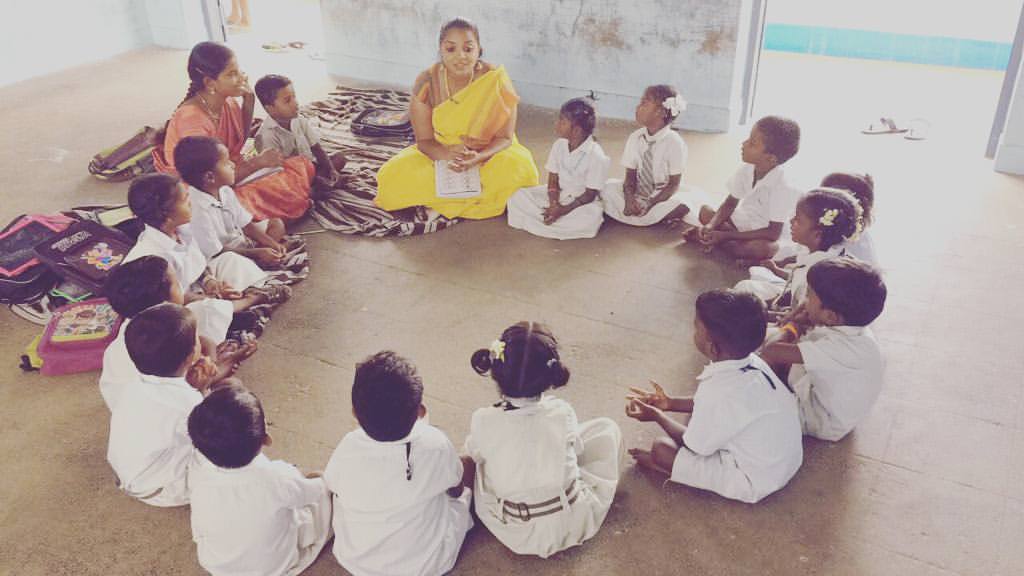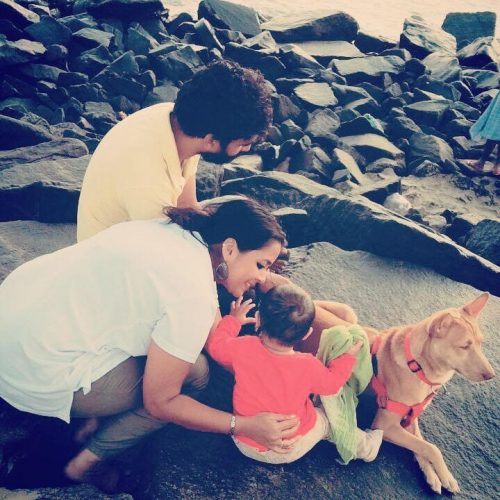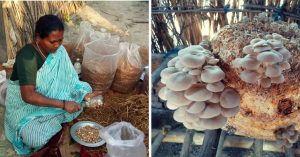This Woman Left Chennai to Run Rural Schools: Here’s What She Learned in Return
The only time I become acutely aware of my gender is when I’m the only woman at a 'decision-making meeting'.

Nisha Subramaniam leads education and rural community development projects with the ASSEFA Foundation. She previously served as Senior Program Manager for Teach For India’s operations in Chennai.
Q: You’re a Chennaite who also taught in a school in Mumbai. Why move from a big city to Kannarpet – a rural coastal village?

A: As a Teach for India Fellow, I taught in a low-income community in Govandi, Mumbai for two years. Every single day, when I crossed over the railway tracks and entered my community, I saw such a different Mumbai. There was no glitz, no high rises, no free-flowing electricity, no restaurants or glass buildings. It had struggle written all over.
Seeing how much the children I taught had to struggle for basic necessities strengthened my conviction that we can’t have circumstance dictate one’s destiny.
Also Read: How a Fashion Major-Turned Teacher Is Transforming the Education Landscape for His Students
That experience has been a driving force for me to support children to move out of the poverty cycle and transform their current realities. Exploring rural India has been part of this quest to understand our country and her complexities. I want to make India a place where a child’s birthplace doesn’t dictate her destiny.
Q: What are you focused on now?
A: I lead efforts in education with ASSEFA foundation – a 50-year-old organization working in rural Tamil Nadu. My husband, Gowtham (also a Teach For India alumnus), and I are passionate about transforming our schools and communities, and we work with five rural coastal schools. The goal is to create communities that are financially stable and healthy and demonstrate a collective commitment to be the ‘champions their children deserve’.
As part of the community development efforts, I work with a team of mothers on an entrepreneurial venture called SURA. Collectively, we design bags, totes and bed covers in cotton and kalamkari fabric. Over the months, we have been able to ensure that the women earn about 2,500 to 3,000 rupees a month.
In a community where ‘stable income’ is unheard of, this has created a tremendous sense of possibility among these ladies and in their community. This has made it easier for the ladies to apply for a second loan and buy themselves a motor-fitted sewing machine, which increases productivity and supports their well-being.
Q: How does gender influence your workplace?
I love being a woman and I see that it impacts my role in many wonderful positive ways. Working in a rural set-up I see that people are able to connect to the more ‘domestic’ aspects of me as a woman and it makes it easier, in some ways, to then move to talking about the ‘professional’ aspects of our work.
I feel comfortable acknowledging that there are different aspects to me. Being a woman, I see greater ease and acceptance in a village women’s meet or when I walk into a room full of teachers who’d like to talk about better toilet facilities for the women staff in the school. Moving into a role which was traditionally done by men in the past, I see that women in community and schools welcome having a woman lead their schools.
The only time I become acutely aware of my gender is when I’m the only woman at a ‘decision-making meeting’. It strengthens my resolve to open doors and bring in more female voices into such meetings.
Q: You’re a new mom. What has this new role revealed to you?

A: As a new mother, I think about the world I want my daughter to grow up in. I’ve now normalized salaries for male and female staff across levels in our schools. It was a tough decision to execute, but when I firmly explained my stance, the equal salaries became the new norm. It’s important that the children we work with see this equity as well.
Since our daughter has hopped into our lives, I catch myself over-compensating at work for the hours I spend at home with my child. Establishing a sense of harmony between mothership and work has been a challenge. As a woman, I often feel there is an expectation from my community to be “kind and considerate” or “more flexible” than “Sir” (my husband).
It has been interesting to see the difference between urban and rural perceptions. In rural areas, people are more forthcoming about their gendered expectations and stereotypes, whereas we’ve found ways of glossing it up in urban settings. When I tell the women in my rural community that I spend additional hours outside home or travel for work, they’re surprised.
My husband often works from home, doing the babysitting for our daughter, and I have had quite a handful of “urban people” in my life tell me to “take it easy with work” until my daughter grows up. It is interesting that my husband has never been asked to do that! There’s definite bias no matter where you live.
Also Read: This Small School Was Going to Shut Down, Until Two Teachers Had a Unique Idea – Driving!
Q: What’s the ideal kind of education for people—both rural and urban?
A: I think a better question to ask ourselves, is what kind of a world do we want and hence what kind of an education do we want. I believe, the biggest contribution we can all make is to question, to inquire, to be curious and reflective – education is not the work of the school system or a bunch of educators. It is everybody’s work, going through it mindlessly doesn’t help anyone.
To learn more about Teach For India, visit here. To apply for the 2018-2020 Fellowship, submit your application here by March 25th, 2018.
Like this story? Or have something to share? Write to us: [email protected], or connect with us on Facebook and Twitter.
NEW: Click here to get positive news on WhatsApp!
This story made me
-
97
-
121
-
89
-
167
Tell Us More
We bring stories straight from the heart of India, to inspire millions and create a wave of impact. Our positive movement is growing bigger everyday, and we would love for you to join it.
Please contribute whatever you can, every little penny helps our team in bringing you more stories that support dreams and spread hope.



















